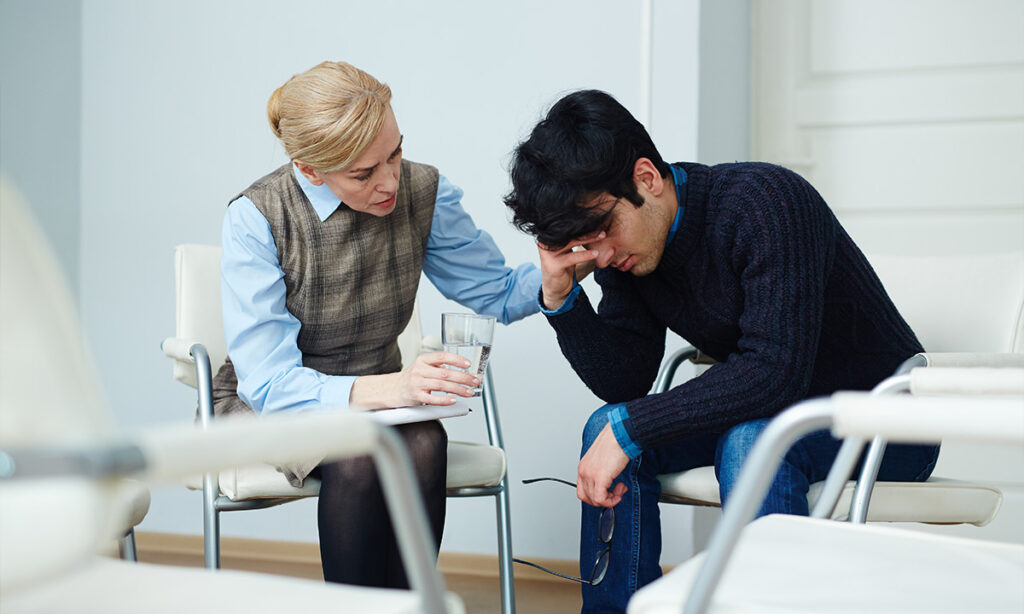Alcoholism and depression often occur together, but it can sometimes be hard to tell which one came first. Getting treatment for both alcohol use disorder and depression at the same time can help you regain mental stability, physical health, and happiness.
In this blog post, we will explore the relationship between alcohol and depression. We will look into the different aspects and connections between the two, and how to find help if you or a loved one is experiencing these issues.
What Is Depression?
Depression is a mental health condition where a person feels very down or sad for a long period. It is not just a fleeting feeling of sadness; it is more profound, and tends to affect one’s daily life. This includes the ability to work, eat, or enjoy time with family and friends.
Depression is not something that you can just “snap out of”, but the good news is, it can be treated. It is essential first to understand depression as a medical disorder before we explore how it can be linked with alcohol use.
Types of Depression

Depression can appear in different forms, each with its own characteristics. Here are some common types:
- Major Depressive Disorder (MDD): This is when a person has a heavy feeling of sadness that lasts for at least two weeks. It can affect your sleep, eating habits, and your ability to focus.
- Persistent Depressive Disorder (PDD): A milder but long-term form of depression that lasts for at least two years. It is usually not as intense as MDD.
- Seasonal Affective Disorder (SAD): This type of depression comes and goes with the seasons. It usually appears in the winter, when there is less sunlight.
- Postpartum Depression (PPD): This form of depression occurs in new mothers, usually soon after giving birth.
- Bipolar Disorder: This is different from depression, but people with bipolar disorder can have episodes where they feel very low and show signs of major depression.
Depression Symptoms
When someone has depression, they may experience different symptoms, such as:
- Constant sadness or a feeling of emptiness
- Difficulty concentrating or making decisions
- Loss of interest in activities they once enjoyed
- Feeling very tired and finding it hard to get out of bed
- Changes in appetite or sleep patterns
- Thoughts of death or suicide
If you notice a loved one showing signs of depression, it’s important to approach them with empathy and understanding. Talk to them gently and suggest they seek help from a professional. Make sure to learn about depression yourself, so that you can support them better, and be patient, as recovery can take time.
Alcoholism and Depression
Often, people experiencing depression might turn to alcohol, self-medicating to try to manage their feelings. However, this can create a cycle where the alcohol makes the depression worse, and the depression makes the person want to drink more. It can be a tough cycle to break.
Alcohol Use Disorder

Alcohol Use Disorder (AUD) is a medical condition where a person cannot control their alcohol use, despite negative consequences. It is not just about how much alcohol is consumed, but also the inability to stop or limit alcohol use. It can have serious effects on a person’s health, relationships, and work.
Does Alcohol Cause Depression?
Alcohol can certainly contribute to depression. While it may not cause depression in every person, heavy use of alcohol over a long period can increase the risk of developing depression.
Alcohol often worsens existing depression symptoms, making it harder for individuals to manage their mental health effectively. It is also possible for depression to lead to alcohol misuse as a form of self-medication. This can develop into a cycle of worsening symptoms for both conditions.
Co-Occurring Disorders
When someone has both alcohol use disorder and depression, it is known as a co-occurring disorder. This situation is not uncommon, and can make both conditions more severe and harder to treat. Seeking professional treatment for both conditions simultaneously is often the most effective approach.
Dual Diagnosis Treatment

Dual diagnosis treatment aims to treat both issues at the same time. This type of treatment takes an integrated approach, helping individuals address both their alcohol use and their mental health issues.
Dual diagnosis treatment can include therapy, medication, and support from loved ones. A specialized treatment plan makes it easier for the person to recover fully and lead a healthier life. The goal is to help them find healthy ways to cope and improve their overall well-being.
Remember, if you or someone you know is struggling with alcohol use disorder and depression, help is available. At Baystate Recovery Center, we are committed to providing comprehensive care that addresses all aspects of a person’s well-being. If you or someone you know is struggling with alcohol use and depression, don’t hesitate to reach out for help.
